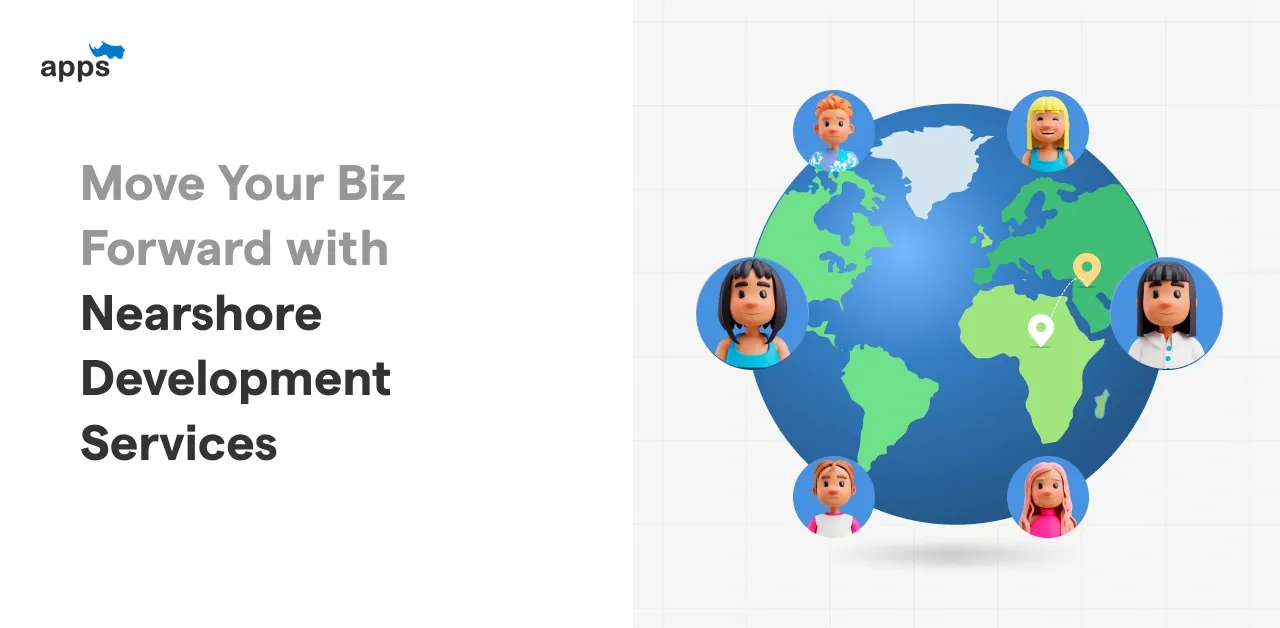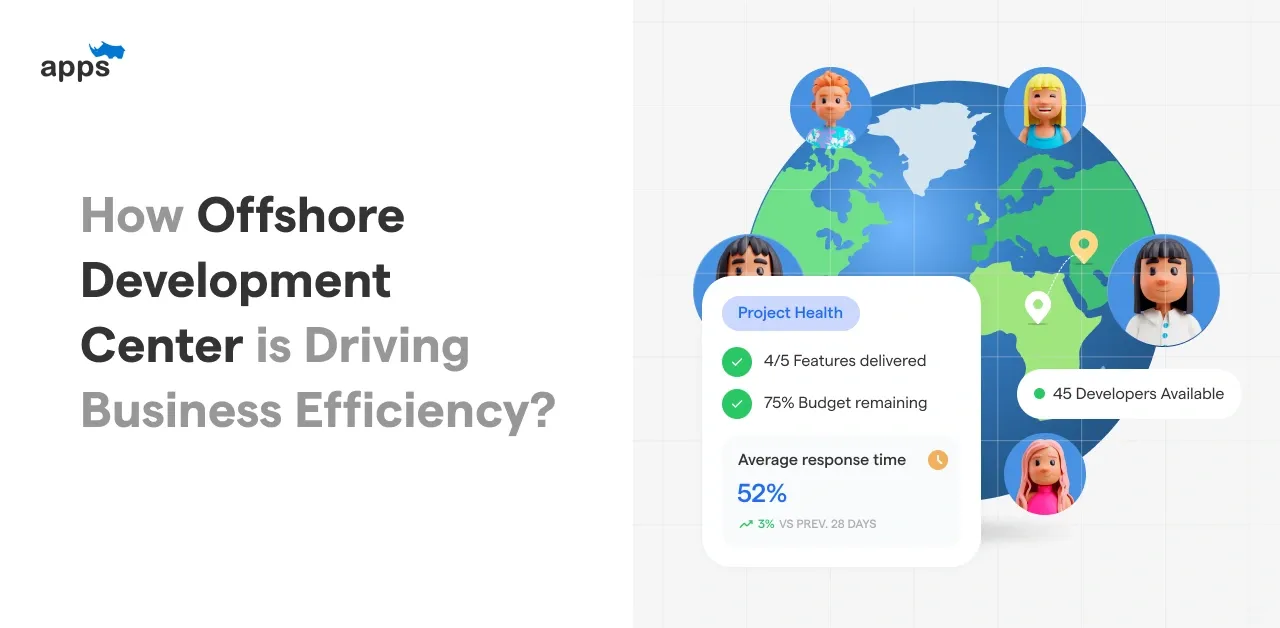- What is Offshore Software Development?
- The Pros of Offshore Software Development
- The Cons of Offshore Software Development
- Understanding Different Offshore Models
- Key Factors When Choosing an Offshore Software Development Partner
- Tips for Managing an Offshore Development Team
- Conclusion
- Frequently Asked Questions (FAQs)
Table of Contents
All you need to know about Offshore Software Development

Fuel efficiency and fancy features are great, but sometimes you need a deeper understanding to truly appreciate a vehicle.
Our guide on offshore software development works a lot like that. Sure, you've probably heard about its cost benefits and access to global talent. But to truly unlock its potential, you need to dive deeper.
In this guide, we'll tackle all aspects of offshore software development. We'll discuss the challenges and how to overcome them. You'll get to explore different offshore models and uncover the key factors to consider when choosing your offshore partner. We'll even give you some pro tips on managing your offshore team.
Our goal is to help you understand the nuances and make the most out of this powerful approach for your business. So fasten your seatbelts, and get ready for this interesting journey into the world of offshore software development!
What is Offshore Software Development?

Offshore software development is a straightforward way to get software built by a team in a different country. It's kind of like sending your coding work on a trip! Companies do this to get more than just nice 'trip photos’ - it's often about saving money, or finding the right people for the job who just happen to be living somewhere else.
The idea is that companies in countries with higher living costs can hire teams in countries where costs are lower. This way, they get the quality work they need but at lower prices. A company in the United States, for example, might hire a team in India to develop software. The same work, same quality, but done at a cheaper price. That's a big win.
But it's not always about money. Sometimes it's about finding unique skills. In the tech world, certain regions are famous for specific tech expertise. So, a company might go offshore to tap into that specialist knowledge.
In short, offshore software development offers a way for companies to get their software built by teams in different countries. This can save money, or help to find specific skills. All this without having to invest in building their own team in-house. Pretty cool, right?
The Pros of Offshore Software Development
Offshore software development has grown in popularity for a range of good reasons. Companies find many benefits to working with teams in different countries. Let's break it down and look at the key pros that make this method so appealing.

Cost-effectiveness
When it comes to saving money, offshore software development can be a real game-changer. Outsourcing the work to countries with lower living costs means that you'll often save on labor costs.
This allows you to stick to your budget without compromising on quality. For small and big companies alike, this means more projects can be completed, keeping everyone happy.
Access to Global Talent
Building a custom software can be a bit tricky, especially when you need specific skills that may be hard to find locally. By going offshore, you can tap into a larger pool of skilled professionals from around the world.
And, as we know, the more brains, the better! It's like unlocking a treasure box filled with the talent needed to make your dream software come to life.
Flexibility
When work never sleeps, keeping up with projects can get overwhelming. That's where offshore software development helps. Having a team in different time zones means that while you're off the clock, someone else is picking it up. This way, your projects keep moving.
Plus, if you need to scale your team, you'll have better chances of finding additional team members with broader global reach. No more sitting around waiting for people to show up for work - they're already busy!
To sum up, choosing offshore software development can lead to fantastic benefits. From saving money to getting access to talented professionals across the globe, this method offers a fresh and flexible way to build software. It's like having the power of the world at your fingertips, ready to help you create your tech vision.
Pretty satisfying, right? So, if offshore development sounds promising to you, dive in and explore its pros further to unleash your project's true potential.
The Cons of Offshore Software Development
Offshore software development sounds great, right? And it is! But, like most things in life, it's not without a few challenges. It's important to understand the potential downsides to make sure it's the right choice for you. Let's dive into some of the cons that can come with offshore software development.

Communication Barriers
Languages and accents can differ around the world. Throw in different cultural norms, and sometimes communication can get tricky. Misunderstandings can lead to delays or tasks not being done as needed.
Regular check-ins and clear guidelines can help alleviate this. Still, it's important to be prepared for a few hiccups along the way.
Time Zone Differences
Having a team in different time zones has its perks. Work continues even when you're sleeping! But when you need a quick response or have to solve an issue, the time difference can be a pain.
Depending on how big the time difference is, your working days might hardly overlap. It’s a bit like playing tag with time!
Quality Concerns
Quality is key when it comes to software development. Now, not all offshore software developers will deliver poor-quality work, but it could happen.
Keep in mind that it's sometimes harder to control the quality of work that's done miles and miles away. Of course, there are ways to ensure high-quality work (like regular code reviews), but it’s something to keep in mind.
While there are notable cons, none are deal-breakers. Each of these can be managed with good strategies and patience. Recognizing these potential pitfalls helps you plan better and make sure offshore development is successful and beneficial for your project.
It's essential to pay attention to these factors and manage them well to fully enjoy the benefits of offshore software development.
Understanding Different Offshore Models

We've talked a fair bit about offshore software development. You might be thinking, "Great, but where do I start?" Well, clear up some room in your brain, because we're about to introduce three main offshore models. Each has its own style and benefits, so let's get started.
First up is the project-based model. It's as straightforward as it gets. You have a specific project, your offshore team does the whole job. From start to finish, they take care of it based on your brief.
Next, we've got the dedicated teams model. In this case, the offshore firm provides you with a team of experts who work as your own remote team. They align with your business goals, core hours, and essentially become an extension of your local team.
Finally, there's the hybrid model. This one's a mix of the first two. You might have a dedicated offshore team that works on your ongoing operations, while a project-based team takes care of individual special projects.
Each model presents a different way to work with your offshore software development team. Depending on the specifics of your project, one may fit better than the others. Consider what you need, what you have, and what you hope to get out. This will help you zoom in on the right model for your project.
Key Factors When Choosing an Offshore Software Development Partner

Ready to choose your offshore software development partner, but not sure what to look for? We've got you covered. Here are some key factors to consider. Like a grocery list for finding your perfect software development partner!
- Expertise
Check what the company specializes in. Make sure they're good at what you need. It's a bit like selecting an artist based on the style you like for your portrait!
- Communication
How well do they communicate? Look at how swiftly and clearly they respond. Remember, clear communication is key to overcoming potential challenges down the line.
- Past Projects and Clients
Take a peek at their previous work. Like a music artist's previous tracks, prior projects can help you understand their signature style.
- Testimonials
Ever read book reviews before picking one? It works the same here. Testimonials from their previous clients will give you a clear picture of what it's like to work with them.
- Pricing
As always, pricing is important. Make sure their services fit within your budget. No use falling for a pair of shoes only to find out they're too pricey!
Take these factors into account when selecting an offshore development partner. Each of these criteria will help you land a company that meets your needs and expectations. Good luck with your hunt!
Tips for Managing an Offshore Development Team

You're all set with an offshore development team? Great! Now comes the next challenge: managing the team effectively. Here are some helpful tips to keep your teamwork running smoothly, like a well-oiled machine.
- Define Clear Goals
Set unambiguous, achievable goals so everyone knows what the expected outcomes are. It's like pointing everyone to the finish line!
- Establish Regular Communication
Schedule routine meetings and check-ins to make sure everyone stays on the same page.
- Prepare for Time Zone Differences
Plan your communication around time zone differences. Make sure both sides get the most out of the overlapping working hours.
- Clarify Roles and Responsibilities
Every team member should understand their role and what's expected of them. No confusion, no mix-ups.
- Track Progress
Keep a close eye on the project's progress to ensure everything is on track. Catching issues early on will reduce the risk of any delays or miscommunications.
- Build Trust
Foster a positive relationship between you and the team. Encourage open communication and show appreciation for their work. A supportive environment can work wonders!
Follow these tips to manage your offshore development team effectively, and you'll be on your way to a successful project. Just like a confident pilot navigating through different time zones, you'll empower your team to achieve their best work!
Conclusion
Offshore software development can be a powerful approach for your business. It’s like a secret weapon for cost-effectiveness, access to global talent, and flexible working.
Yes, there are challenges like communication, time zone differences, and quality concerns. But with good strategies, they're all manageable!
Remember to understand different offshore models and consider key factors when picking your partner.
Soon, you'll be managing your offshore team like a pro. Remember, it's all about making the world your playground and navigating it smartly.
So, gear up and get ready to take your business to the next level with offshore software development!
Hire Dedicated Offshore Developers for various technologies such as Android, Angular, React, IOS, PHP, Node, Joget, MongoDB, and Java with AppsRhino:
Contact us today to discover more about how we can assist you with your offshore development needs!
Frequently Asked Questions (FAQs)
What if my offshore team doesn't speak English fluently?
Having a common language is important. If the language barriers cause issues, you might want to consider language classes for the team, or hiring a team with stronger English skills.
How do I handle legal and privacy issues in offshore software development?
Get a legal advisor with international expertise. Have clear contracts addressing intellectual property rights, non-disclosure agreements, and local laws.
Can I visit my offshore team?
Sure! In-person visits can strengthen your relationship with the team. But do consider travel restrictions due to current global situations.
Table of Contents
- What is Offshore Software Development?
- The Pros of Offshore Software Development
- The Cons of Offshore Software Development
- Understanding Different Offshore Models
- Key Factors When Choosing an Offshore Software Development Partner
- Tips for Managing an Offshore Development Team
- Conclusion
- Frequently Asked Questions (FAQs)




